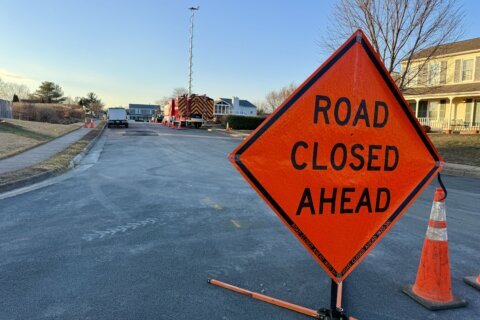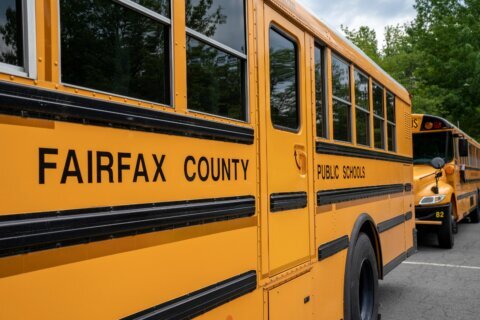This video is no longer available.
When a fourth grade class visited Patrick Henry Library in Vienna, Virginia, a conversation about a digital resource transitioned into one about how the library handles challenges to its materials.
Andréa Fernandes, the library’s youth services manager, showed the students a website that started as a streaming platform for academic movies, and has options for kids and families. When the students saw there was a horror movies category, they asked if it included R-rated films. Fernandes said it was likely, but urged the students who aren’t allowed to watch those movies to look through the kids and family section.
Then, a student said they heard about some libraries banning books, and asked if that was happening in Fairfax County. It gave Fernandes a chance to talk about how the library chooses its materials, adding that at Patrick Henry, books aren’t really getting pulled off the shelves, and few people are formally challenging materials.
“We don’t say ‘kids can check out grown-up books’ or vice versa — you decide what you’re going to check out,” Fernandes said she told the students.
As some books are getting challenged across the country — and in some cases, removed from school libraries in Virginia — few concerns result in formal complaints in Fairfax County libraries, according to Dustin Booher, the library system’s collection coordinator. On average, one or two books per year make it to the formal review process.
Many more make it to the initial step of a conversation about a book, Booher said. Before that, there’s usually someone like Fernandes working in a library branch who hears about the concern.
“We’ve now come to a point where there is a large group of people who don’t trust our expertise, our authority, our training,” Fernandes said.
‘Every book isn’t for every person’
Book bans have become a national talking point, including this week, Banned Books Week, during which some places celebrate materials that have been banned or challenged elsewhere.
Part of the Fairfax County library’s digital catalog this week includes a section with books that have been challenged.
Deborah Smith-Cohen, assistant branch manager at Patrick Henry, said book bans and book challenges aren’t the same. Many books that are challenged never get banned, and some challenged books get removed from shelves during the review process.
And some books, according to Smith-Cohen, are reviewed and reclassified. For example, one could move from juvenile collections to teen collections.
A few months ago, a mother approached Smith-Cohen about a book that she didn’t think should be in the juvenile section, because it bothered her daughter when she was reading it. So, Smith-Cohen pointed the mother to a website where she could have a meeting and make a formal statement saying it needed to be reconsidered.
The mother never took those steps. That’s common, Smith-Cohen said.
“The most common experience we have is that people need to be heard, that they’ve made the decision that a book is not appropriate for their child at this time, but they aren’t necessarily obsessed with making a decision for other parents or other children,” Smith-Cohen said.
“Every book isn’t for every person,” she added.
Sometimes, according to Smith-Cohen, there’s “informal suppression” that could happen. During Pride Month, for example, she said the library displays LGBTQ+ books.
“They disappear, people hide them in the branch, sometimes they check them out so that they won’t be returned until the following month, when (Pride Month) is over,” Smith-Cohen said. “So there are fewer of them available for people who might read them.”
Generally, Booher added, a staff member is alerted to a concern with a book, and after someone puts a concern in writing, the county starts a process during which it finds three librarians to volunteer to review the material. They read the book and share their thoughts, keeping the concern in mind.
In some cases, “if there is something where we realized we made a mistake, we put something in a children’s section that didn’t belong there, that can be changed without going through the formal process,” Booher said.
Children’s material tends to be challenged most often, Booher said.
“Many challenges come from the standpoint of a book — ‘this does not represent an appropriate depiction of Black life, this doesn’t depict an appropriate representation of Hispanic life, this is out of date and needs to be removed because it’s inaccurate,'” Smith-Cohen said.
Not a ‘little fun side gig’
To accumulate its books, Booher said the library system relies on some external sources, reviews, customer suggestions and marketing materials, because it’s not possible for library staff to read every book on the shelf.
Often, Fernandes said, people expect the library staff to read every book in the building.
“It’s not just a little fun side gig and you have all this time to read — no problem to just personally read every single book and label it with all the content in it,” Fernandes said. “We don’t have that kind of time.”
There are also differences in what parents and others may consider to be inappropriate, Fernandes said.
“There’s that whole argument of ‘you’re groomers, you’re pedophiles,’ and that’s mostly targeted at the people who are working with kids,” Fernandes said.
As a result of the climate, Fernandes said she’s been more deliberate in how she responds when someone asks whether a book is appropriate for them or their child.
“Some families consider any reference to a butt as cursing, and some families don’t,” Fernandes said.
One parent got upset about a variation of “If you’re happy and you know it” that included a lyric about stomping feet if you’re angry.
“She didn’t like that we were teaching her kid how to be angry,” Fernandes said. “We’re walking a little more carefully right now. In Fairfax, we have been lucky that we haven’t gotten as much of the really bad arguments.”
Book Rebels
Once a month, Fernandes hosts a book club called Book Rebels. It meets in the Vienna Community Center, and includes kids from sixth grade through high school.
Generally, Fernandes said, the group reads books that have been banned or challenged in some places.
The books and topics vary, but the group is a platform to talk about various topics.
“It’s good to hear their perspectives,” Fernandes said. ” … It’s interesting to hear them bringing in their takes on what’s happening.”








